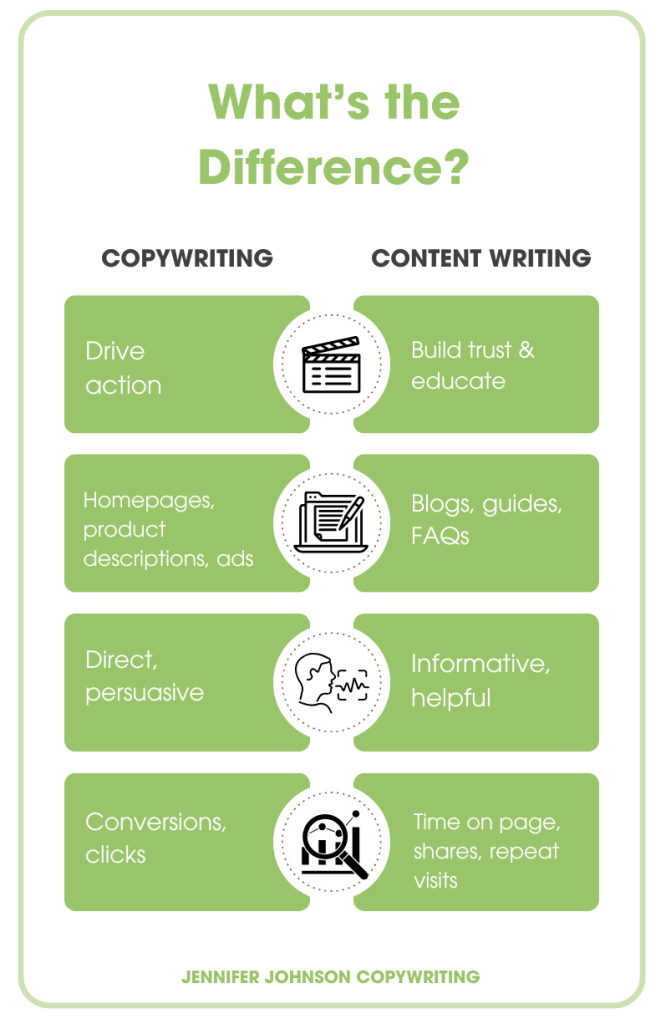What’s the Difference Between Copywriting and Content Writing?
- Jennifer Johnson

- Apr 29
- 5 min read
Updated: Jul 15
If you’ve ever Googled “copywriter vs content writer” and closed the tab two minutes later, you’re definitely not the only one.
It’s one of those distinctions that gets talked about a lot, but still somehow stays unclear; especially when writers (like me) often work across both. Add in the fact that the lines blur depending on the project, and it’s easy to feel a bit unsure about what’s what.
Still, understanding the difference can really help. It makes it easier to hire the right person. To brief them clearly. To know what to ask for and what kind of writing will actually support the goal you have in mind.
So, in this post, we’re going to untangle the two: what copywriting is, what content writing is, where they overlap, and how to figure out which one you need (or when you might need both).
What Is Copywriting?
Copywriting is writing with a job to do.
Usually, that job is to get someone to take action: buy the thing, book the call, sign up for the list, click the button.
It’s the writing you see on homepages, product descriptions, sales emails, landing pages, and ads. It’s strategic, purposeful, and often a little more direct. Not in a pushy way, just clear about what it wants the reader to do next.
Done well, copywriting guides. It creates a little momentum. It makes someone feel like, “Ah, yes, this is exactly what I’ve been looking for.”
It’s not just about being persuasive. It’s about knowing what matters to your audience, and writing in a way that feels right for them.
For example:
A product description that helps someone imagine using it in their real life
A headline that quickly tells a new visitor what you do, who it’s for, and why they should stay
A landing page with a clear, confident link to shop, book, or learn more
Copywriting works best when it’s grounded in strategy, but still sounds like a real human wrote it.
What Is Content Writing?
If copywriting is about prompting action, content writing is about building connection.
It’s the blog post that answers a customer’s question.
The how-to guide that helps someone understand what they need.
The newsletter that keeps your audience engaged — even when you’re not selling anything.
Content writing is usually longer-form. It’s designed to inform, support, or share something useful. It’s not asking for an immediate decision, but quietly laying the groundwork for trust, visibility, and long-term loyalty.
For example:
A blog post explaining how your products are made (and why that matters)
An FAQ page that helps reduce returns or support queries
A seasonal guide that helps your customers make better buying decisions
Good content writing is thoughtful, structured, and helpful. It respects the reader’s time and gives them something they can take away, whether they buy today or not.
And when it’s done consistently, it starts to shape how people see your brand. As helpful. As generous. As someone worth returning to.

Where They Overlap
Of course, it’s not always one or the other.
Some writing blurs the lines, and that’s not a bad thing.
Take an email newsletter, for example. It might start with a story, offer some tips, and then wrap up with a link to shop. That’s content and copy, working together.
Or think about a blog post that’s written to genuinely help your reader, but ends with a clear invitation to explore your products. Still helpful, still informative… but with a little nudge.
So whether it’s copy or content, the strongest writing tends to share a few things:
A clear sense of who it’s for
A reason for being there
A voice that feels honest and human
And when those elements are in place, the lines don’t matter quite so much.
Which One Do You Need?
This is usually the real question behind all the Googling.
Do I need a content writer… or a copywriter… or both?
The answer depends on what you want your writing to do.
If you’re launching a new product, updating your homepage, writing a welcome email, or planning a sales campaign — you’re in copywriting territory. The goal is action, and you want words that help people take it.
If you’re building out your blog, answering customer questions, sharing tips on Instagram, or writing a seasonal guide — that’s content writing. The focus is on connection, education, and being useful over time.
But the truth is, most businesses need both. Not all at once, and not all the time. But both have their place.
You don’t need to know all the lingo. You just need to know what you want your content to do, and find a writer who can help make that happen.

How to Find the Right Writer for the Job
Once you know the difference between copy and content, the next step is making sure the person you hire knows it too.
Whether you’re posting a job description, browsing freelancer profiles, or putting together a brief, using the right words can make a real difference in who applies — and how well they understand the job.
If you need regular blog posts, how-to guides, or SEO-friendly articles, look for someone who describes themselves as a content writer or blog writer. They’ll likely have experience with things like structuring posts, writing for search, and keeping readers engaged over time.
If you’re updating your homepage, launching a product, or writing a sales email, you’ll want someone who specialises in copywriting — especially for websites, e-commerce, or email campaigns. They’ll be focused on clarity, conversion, and getting the wording just right in fewer words.
Of course, some writers (like me) do both. But not everyone does, and not everyone wants to.
So if you’re hiring a freelancer, it’s worth asking:
What kind of writing do you enjoy most?
Do you focus more on copywriting, content writing, or a mix?
Have you written for businesses like mine before?
And if you’re writing a job description or project brief, be specific about what you’re looking for.
Instead of:
“Looking for a copywriter to help with ongoing blog posts”
Try something like:
“Looking for a content writer with blog experience to create helpful, SEO-friendly posts for our [industry] audience”
The more accurately you describe the role, the more likely you’ll attract the right person for it.
Wrapping Up
Hopefully this has helped untangle some of the confusion and made it a little easier to understand the role different types of writing can play in your business.
You don’t need to have all the terms perfect. You don’t need to become a copy-versus-content expert overnight. You just need to know what you want your words to do, and find someone who can help you get there.
And if you’re looking for someone who can work across both with care and strategy, I’d love to hear from you.






Comments